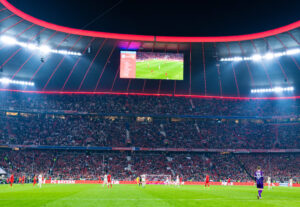The MLS is an odd football league. It stands out from most of the established league systems in world football. It’s a meeting point, where American franchise sports meets the international football system. This odd league, operating in an established international system, often draws the ridicule of international fans. The MLS is one of few leagues in the world that doesn’t have a promotion and relegation system but is one of the most competitive.
On top to that, no MLS team has ever won the CONCACAF Champions League, with every team that has ever made it to the final losing to a Mexican side.
Yet, despite all this, the MLS continues to grow at an incredible pace. It is one of the fastest-growing football leagues in the world. The quality of the football has greatly improved over the past few decades, leading to more fans in the stadiums, which has led to more stadiums being built and others expanded.
Talents such as Carlos Vela, Giovanni Dos Santos and Josef Martinez are flooding to the MLS, shedding the image of it being a retirement league.
Despite all this, the MLS has brought some remarkable ideas to the world of football. Ideas that have led to the MLS being far more competitive than any major league in Europe. And while people always talk about what MLS can learn from Europe, perhaps it’s finally time for Europe to look towards MLS for some innovation.
The MLS Can Improve European Football
Healthy Competition v Tradition
The most important aspect of good competition is that it is competitive. Fans don’t want to tune in to a tournament for ten straight years knowing that the same one or two teams alone will win.
While comparing leagues is not always easy, it’s essential that we try. To compare the MLS system against Europe, we’ll put them up against Europe’s top four leagues. They are the Premier League of England, La Liga of Spain, Serie A of Italy, and the Bundesliga of Germany.
First off, the MLS. Founded in 1993, the league didn’t begin to play until 1996. The MLS was a part of the United States’ 1994 World Cup package deal: founding a new professional football league in exchange for hosting the world cup. Since that time, Major League Soccer has played a total of 25 different seasons. In 25 years, the MLS has seen an incredible 13 clubs lift the MLS Cup. Only two MLS clubs have lifted the trophy more than twice.
That is an incredible statistic, meaning that the MLS averages a new champion every two years. As a matter of fact, the MLS has never had a single team win the MLS Cup three years in a row.
Europe v America
Now we move on to La Liga of Spain. The Spanish Primera Division commonly referred to as La Liga, began to play in 1929. In 91 seasons, Spain has seen only nine clubs be crowned champions. Of those nine, only five have won more than three titles, with two clubs, in particular, Real Madrid and Barcelona, having won sixty titles between them, or 66% of all available La Liga titles.
Things aren’t that much better in Italy, where, in 119 years of professional Italian football, only 16 clubs have been crowned champions. The past decade, in particular, has seen only two clubs winning the Italian league, Serie A, with one of those clubs, Juventus, winning the last nine consecutive titles.
In Germany, we see an improvement of sorts, with 29 different champions being crowned in German history. however, with the launch of the Bundesliga 58 years ago, only 12 clubs have been crowned champions. One club, in particular, has outshone the rest of the competition, with Bayern Munich winning 29 out of a possible 58 Bundesliga titles, an astounding 50% of all available Bundesliga titles, including every title since the 2012-13 season.
Finally, we have England and the Premier League. With the sport’s oldest league system, the combination of the Football League and the Premier League has seen England crown 24 different clubs as champions. Since the inception of the Premier league in 1992, seven clubs have won the title, with Manchester United winning it 13 times, the most of any club.
So the MLS is doing something right, it is undoubtedly more competitive and unpredictable than any of the four big leagues of Europe. The question is, why? Why is this up-and-coming league from America so much more competitive than the best of the best? And there are many reasons why that is, but there are two reasons that stand out above all others: the salary cap, and the playoff system.
The Salary Cap Makes MLS Competitive
The salary cap is not an MLS invention: it’s a common feature in American sports that allows the leagues to be competitive and prevent overspending and bankruptcy. The way it works is simple: the MLS salary cap is $11.6 million. That means that for an MLS club in 2021, they have $11.6 million to spread across their entire team.
If an MLS club finds that they can’t fit a player into their allocated budget, they can’t sign him. They’ll either have to trade him, convince him to take less money or watch him leave as a free agent.
This forces teams to build around stars with big contracts. It also allows younger talents and academy players to get more chances. Often, teams have to move on from a player simply because they can’t afford him with the salary cap.
This is a big contrast to Europe. Big clubs, with more sponsors, history and titles often have massive budgets. Smaller clubs simply can’t compete with them, annually falling behind.
When smaller clubs do tend to have a good season, they often find their top players taken away by bigger clubs offering more money. In the case of Serie A, the Juventus chairman Andrea Agnelli took things a step further with comments last year.
Speaking in reference to Atalanta, a smaller club that impressed everyone by finishing in the Serie A top four, he said they shouldn’t be allowed to play in the Champions League due to not having enough history.
Agnelli said: “Without international history and thanks to just one great season, they had direct access into the primary European club competition. Is that right or not?”
Salary Cap Imperfections in Competitive MLS
Now, the salary cap system isn’t perfect, because even though limiting clubs’ budgets allows MLS clubs to compete well together, limited funds does not allow the MLS to compete with European clubs which is why the MLS has the Beckham rule, better known as the Designated Player rule.
The Designated Player works like this: every MLS club is allowed to sign three players whose salaries are not counted as a part of the salary cap. A small cheat code to lure talented players from Europe.
With the Designated Player rule, the MLS has seen players like Wayne Rooney, Steven Gerrard and Carlos Vela all sign for the MLS while earning a European-style salary. This is seen as a win-win for the MLS and the players.
The presence of these players excites fans, leading to more attendance, and interest in the sport. For the players, they earn a large salary while playing a role in the growth of the sport in America.
Salary Cap Limitations
Now the salary cap and designated player rules work well in America, a country which has these financial regulations in other sports like the NFL and NBA, but it’s not something that’s been attempted in Europe.
The one wildcard in Europe is relegation. The MLS has no relegation system. Even with a salary cap, clubs that are promoted are going to automatically be operating at a disadvantage. Clubs that have been playing in the top flight league for years will still be wealthier.
And it’s not like Europe has never tried to reel in spending; the Financial Fair Play rules, or FFP attempted to reel in overspending. However, the era of FFP didn’t usher in a new era of competitiveness.
If anything, the FFP seems to have only helped the bigger clubs, as in the era of Financial Fair Play the wealth gap between Europe’s clubs has only grown.
Perhaps an expansion of the FFP with a designated player rule addition could help smaller European clubs. Sadly, one thing is undeniable: the gulf in wealth between Europe’s big and small clubs has destroyed the competitiveness of the leagues. But perhaps a study of how the MLS operates could only benefit the competitiveness and health of the sport in Europe.
Now the second thing Europe can learn from the MLS is something that is definitely easier to implement than the salary cap. It would make the European game more exciting, and European competitions more competitive like the MLS.
The Play-Offs Makes Things Competitive as Proven by MLS
In Europe, the club that wins the most points are crowned champion at the end of the season. That is not the case in the MLS. In the MLS, the team with the most points is awarded a title called the Supporters Shield. The league champion is decided after the season ends; a postseason known as the Play-offs.
This tournament sees the top teams facing off in a cup style tournament. The champion is crowned after a final match called the MLS Cup Final. Now while the team with the most points often enters the play-offs as favourites for the MLS Cup, only seven times has the Supporters Shield winner also gone on to win the MLS Cup. This double was last achieved in 2017 by Toronto FC, showing how competitive it is.
Having this system is a great way to reward the hard work of the team with the most points; winning the Supporters Shield guarantees a trophy and a spot in the Champions League.
At the same time the competition for the flagship trophy, the MLS Cup, remains open and unpredictable. A club that just barely sneaks into the play-offs might not be good enough to compete all year long for the supporters shield. But they might be able to put together one incredible performance that sees them knock out some major heavyweights.
The Play-Offs in Europe
In a league like the Bundesliga, it’s clear that most clubs cannot compete with the financial might of Bayern Munich for an entire season. However, in a play-off format, all it takes is one great game; one performance from a club like RB Leipzig, and Bayern Munich can be toppled.
This system isn’t unique to the United States alone either. Liga MX, the top-flight league in Mexico, utilizes a play-off system as well. It sees the top four teams at the end of the season face off to determine a champion.
The MLS is a younger league, in a country that operates sports very differently from the rest of the world. While European football has been the peak of the sport for the past century, the past decade has shown us that the game in Europe is headed in a dangerous direction. Competition is dying, and a handful of clubs control the wealth and the game.
This is not an issue in the MLS, where a competitive nature is the goal. Your club can go from the best to the worst to the best several times in a decade. No club has ever won the MLS Cup three years running- highlighting how competitive it is.
No club has ever won more than five MLS Cups. New clubs like Atlanta United and LAFC find themselves competitive within years of joining the league. Atlanta United even won the MLS cup within three years of joining the league. Perhaps it’s time for Europe to finally start paying attention to the way MLS, perhaps one of the most competitive leagues, is running football.
Main Photo
Embed from Getty Images






